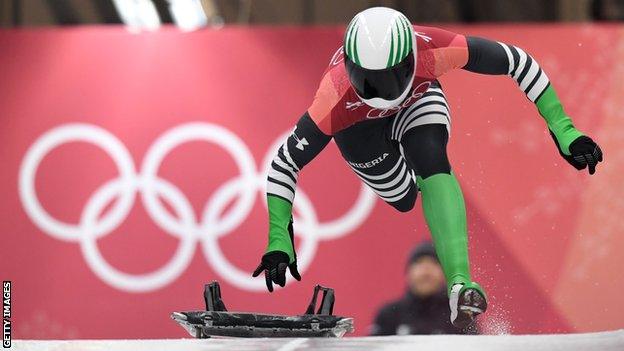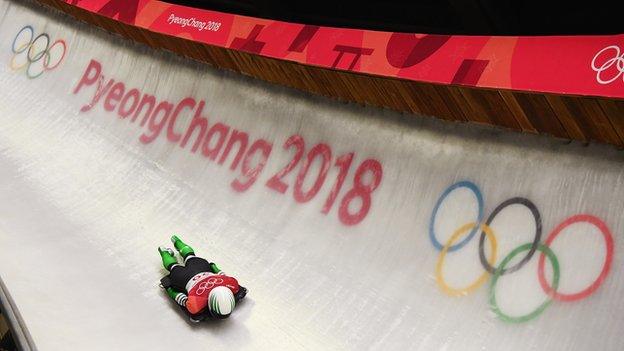Nigerian bobsledder aims for Africa's first Winter Games medal
- Published

Adeagbo finished 20th in skeleton at PyeongChang 2018
Nigerian bobsledder Simidele Adeagbo is preparing for the 2026 Winter Olympics with a clear mission - to become Africa's first medallist in the history of the games.
Three years out from the event - hosted by Italy in Milano-Cortina - the 41-year-old is hoping to build on what was already a ground-breaking debut at PyeongChang 2018.
Adeagbo was the first African and first black women to compete at a Winter Olympics skeleton - a sport she only took up a hundred days earlier.
"At my last Olympic Games in 2018, I was there to open the door to break barriers to participate," she told BBC Sport Africa.
"I've now shifted to a mindset of knowing that I can compete with the best in the world, and that's exactly what I intend to do.
''I want to contend for a medal (in Italy). I intend to be amongst the top of the competition and give it my best shot and see what's possible."
There and back again
Adeagbo was born in Canada to Nigerian parents, before the family moved back to their homeland.
The first six years of her life were spent in Ibadan, south-west Nigeria, before relocating to the US, where she has remained since, including time at college where she developed her sporting passion.
Volleyball, basketball and field hockey were the sports of choice growing up, but track and field was where she excelled - missing out marginally in qualification for the Beijing 2008 Olympics in long jump.
Skeleton and bobsleigh followed much later but following her historic Olympic debut, where she finished 20th in South Korea, Adeagbo changed sport again.

Adeagbo switched from skeleton to monobob after 2018
In a bid to qualify for Beijing 2022, skeleton was switched for the new women's discipline, monobob - the solo bobsleigh event.
She missed out on automatic qualification by just one spot after the qualification criteria changed, a situation she blamed on gender disparity.
Indeed, she remains embroiled in what she hopes will be a "landmark" case for equal rights within the Olympic movement after taking up her case at the Court of Arbitration for Sport (CAS).
In clinched the Monobob World Series title in Germany at the start of 2022, the Nigerian bobsledder became the first African to win an international bobsleigh race.
''My decision to represent Nigeria and not Canada or the US is thinking about the pride that comes with that," Adeagbo said.
"Knowing that anytime I go somewhere, I'm making history that matters to me, because it means that it's going to matter to somebody else. They're going to know that it's possible because I've done it."
A shot at history
Robert Hinton has trained Adeagbo for over a year but the former British bobsledder and army officer has been involved in the winter sport for well over 30 years.
He has no doubt that the Nigerian is a medal prospect at the 2026 Winter Olympics.
''I think she has an incredibly good chance of doing very well," he told BBC Sport Africa.
"If she can get into the top 10 or the top 15 consistently in races, which she will by the end of this training cycle of the international racing, then she has a chance of winning a medal.
"She's improving every single time, I think she will be an effective Olympian at monobob in in 2026, without a shadow of a doubt.
"This is our aim. We're not aiming just to be competitors. We're aiming to do the very best we can."